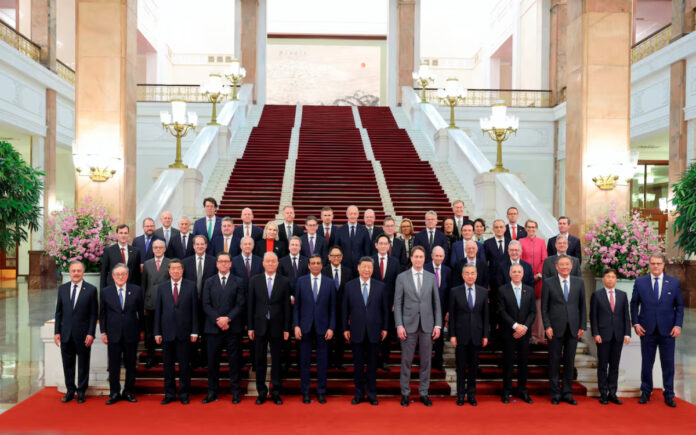Beijing: Chinese President Xi Jinping called on multinational CEOs to help maintain the stability of global industry and supply chains as Beijing seeks to reassure foreign businesses amid escalating trade tensions with the United States. The meeting, held on Friday, comes as concerns mount over the health of China’s economy and the potential impact of fresh U.S. tariffs under President Donald Trump.
Beijing is working to counter fears that a renewed trade war could further slow growth in the world’s second-largest economy, which has faced a sluggish recovery since the pandemic. Business sentiment has also been dampened by regulatory tightening, abrupt crackdowns on foreign firms, and an economic landscape that often favors state-owned enterprises over private and foreign businesses.
“We need to work together to maintain the stability of global industry and supply chains, which is an important guarantee for the healthy development of the world economy,” Xi told the group of executives, which included leaders from AstraZeneca, FedEx, Saudi Aramco, Standard Chartered, and Toyota.
China's President Xi Jinping urged a gathering of multinational CEOs to protect global industry and supply chains, as Beijing seeks to ease foreign firms' concerns over the economy's health amid threats of more US tariffs https://t.co/uAtJabvFg8 pic.twitter.com/ndT3WCXdXc
— Reuters (@Reuters) March 28, 2025
Approximately 40 executives, primarily from the pharmaceutical sector, attended the gathering, which lasted just over 90 minutes. Seven companies were invited to speak, according to a source familiar with the event’s planning.
Sean Stein, president of the U.S.-China Business Council and a participant in the meeting, emphasized its significance. “The CEOs I spoke with, and I spoke with a lot of them, felt it was worth it,” he said. “Not only did the president acknowledge various challenges facing companies and industry, in many cases he pledged the government would take action.”
The executives sat in a horseshoe formation, with Mercedes-Benz CEO Ola Kallenius and FedEx’s Raj Subramaniam directly across from Xi. Other high-profile attendees in the first row included HSBC CEO Georges Elhedery, SK Hynix boss Kwak Noh-jung, Saudi Aramco President and CEO Amin Nasser, and Hitachi Chairman Toshiaki Higashihara.
Frank Bournois, vice president and dean of the China Europe International Business School in Shanghai, highlighted the role of corporate diplomacy in the current global trade climate. “This meeting is a big illustration of business diplomacy. Now there is not just dialogue between bodies, WTO entities, and states, but diplomacy being led by companies that are not just representing themselves, but also their sectors,” he said. However, he cautioned that its effectiveness would depend on concrete actions rather than rhetoric.
The meeting is part of a broader effort by Chinese officials to engage with foreign executives following a sharp decline in foreign direct investment (FDI). Official data showed that FDI into China plunged 27.1% year-on-year in local currency terms in 2024, marking the steepest drop since the 2008 global financial crisis.
Also Read | Red Sea Tourism Under Threat: A Look at Rising Dangers
“Foreign enterprises contribute one-third of China’s imports and exports, one-quarter of industrial added value, and one-seventh of tax revenue, creating more than 30 million jobs,” Xi noted. “In recent years, foreign investment in China has also been interfered with by geopolitical factors… I often say that blowing out other people’s lights does not make you brighter.”
Trump has reignited his trade war with China, announcing a wave of “reciprocal” tariffs set to take effect on April 2. These measures will target countries with trade barriers on U.S. products, potentially impacting China. Earlier this month, Trump imposed 20% tariffs on Chinese exports, prompting Beijing to retaliate with additional duties on American agricultural goods.
“The essence of China-U.S. economic and trade relations is mutually beneficial and win-win,” Xi stated during the meeting.
Last year, Xi held discussions with American business leaders following the China Development Forum. However, USCBC’s Stein indicated that such high-level engagements should not be expected annually. “China’s messaging is that it isn’t an annual event and that businesses shouldn’t expect it to be,” he said.



